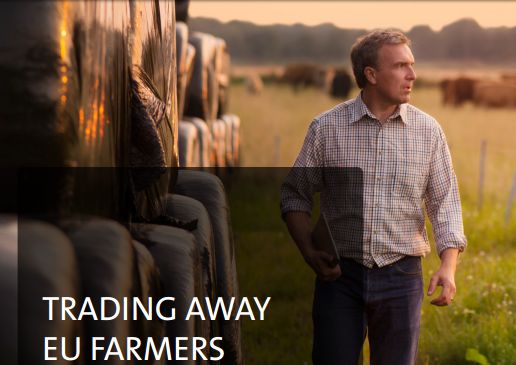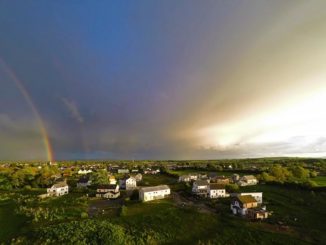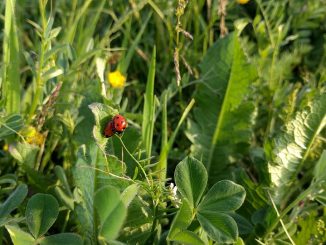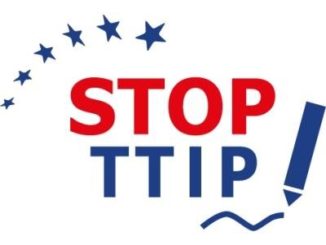A report from Friends of the Earth Europe points to serious concerns for EU farming and food due to the ongoing – and now under severe pressure TTIP talks.
TTIP the Transatlantic Trade and Investment Partnership could impact EU agriculture severely, with much pain and little gain Trading Away EU Farmers finds. In essence, the from Friends of the Earth Europe report exposes how agri-food may be traded off for other sectors more core to the EU economy.
Above: Irish Farmer Organisation the ICSA – Irish Cattle and Sheep Association – protest TTIP and Mercosur on May 4th. Video by Paula Geraghty for Ruptly.
“Studies foreseeing a decline of up to 0.8% for EU agriculture’s contribution to gross domestic product, while US agriculture’s contribution to it will increase by 1.9% – a net trade benefit to US interests of over 4 billion euros”, according to Friends of the Earth Europe, who compiled the report.
Suckler beef is cited as especially vulnerable to lower prices and lower standards from US imports, while negative impacts are also predicted for rural areas and consumer interests.
The report uses modelling studies already conducted to predict potential impacts on beef, dairy, arable, pork and poultry.
Case Study – Ireland
For Ireland, research by the IFA, the ICMSA, ICOS and the Copenhagen Economics report – commissioned by the Department of Jobs enterprise and Innovation – complements these models.
For beef, the report states that “the EU is likely to offer a larger import quota to the US, rather than eliminate tariffs altogether, but this would still have severe impacts on suckler beef production.” Ireland is listed as having the EU’s largest suckler beef herd, with beef central to the Irish economy in general.
A 2015 modelling of US access of either 50 000 tonnes or 75 000 tonnes of beef – described as “probably the most realistic scenario” based on the Copenhagen Economics report – finds that that “if the US is granted a 50 000 tonne quota, Irish beef production will increase by 2.3% but its total value will fall by 1.7% (E34 million) as prices drop. If a 75000 tonne quota is granted, Irish beef production will fall by 0.8% and its value will fall by 3.2% (E64 Million)”.
However “if US beef exports to the EU market are centred predominantly around high-value cuts, the results presented here may underestimate the…contraction in output”
For dairy, “taken together, the various models suggest that the TTIP could lead to lower prices for dairy farmers” the report finds. The ICMSA are quoted as saying “[i]f all of this reduction in value added is absorbed by farmers, which is likely to be the case, farmers’ incomes would actually decrease despite the increase in exports to the US under TTIP.”
An emerging concern noted in the report is that dairy may be traded off against a special category of products called GIs, or Geographical Indicators. These are traditional, regionally specific products. In practice, most come from France, Italy and the UK, while the largest of these are very large and powerful in their respective industries, including champagne, cognac, scotch whisky and many iconic cheeses such as parmesan and feta. ICOS are quoted as saying in 2015 “the fear for us… is that the EU team will sacrifice our interests in getting rid of tariffs and other barriers to trade for Irish product in return for a deal with these GI cheeses.”
Ireland has very few GIs and has listed none whatsoever for protection in the Canadian trade deal – CETA – which is seen as a precursor for TITP.
Arable crops fare poorly too. According to an EU modelling report from 2014, predicted change in cereals value added output will be -4.2% for Ireland, but +1.3% for the US. Of 10 EU Member States or regions listed, only Spain and Portugal performed worse than Ireland. This European Parliament report predicts that eliminating tariffs and reducing non-tariff measures will also lead to a fall in arable oilseed crops of -2.4% for Ireland.
Though the modelling is considered weaker for pork and poultry, a fall of 2.7% in white meat output in Ireland, under conditions of full tariff removal and 25% reduction in non tariff measures, is revealed.
Concern is expressed in the report that even if EU agri-food standards are maintained, “increased imports from the US will still flood European markets, ensuring huge export opportunities and profits for food corporations and US factory farms at the expense of European farmers.”
Average farm size in the US is many times that of the EU, as the European Commission note:
Europe has 12 million farmers and an average farm size of about 15 hectares (by way of comparison, the US has 2 million farmers and an average farm size of 180 hectares)
Lead by Ireland and France, 20 EU agriculture ministers have now expressed concern about the current trade deals the EU is negotiating – TTIP, the Mercosur agreement and the on-going Canadian trade deal (CETA). The European Commission is to conduct an impact assessment, due in September.
Friends of the Earth Ireland’s Chairperson, Dr. Cara Augustenborg, pointed out that there is a dire need for an EU impact assessment of TTIP: “Member States led by Ireland and France have been pushing for the EU to conduct an impact assessment of TTIP on European agriculture. The Friends of the Earth Europe report is the first to examine that impact based on available models. The report confirms that TTIP will lower the value of most Irish agricultural products, particularly beef, because our farming systems cannot compete on price with the intensive, environmentally-damaging, factory-farming systems of the United States.”
She added: “Irish farmers and consumers should be very concerned about TTIP …US government and producer organisations are openly calling for the EU to weaken protection in areas such as the approval of GM foods, pesticide safety rules, and the bans on hormones and pathogen washes in meat production. The quality of our food is superior to US products with respect to EU food production and safety standards. It’s critical to protect those standards and our agricultural enterprises from the potential damage that TTIP could inflict.”
A version of this story first appeared in the Irish Examiner newspaper.







